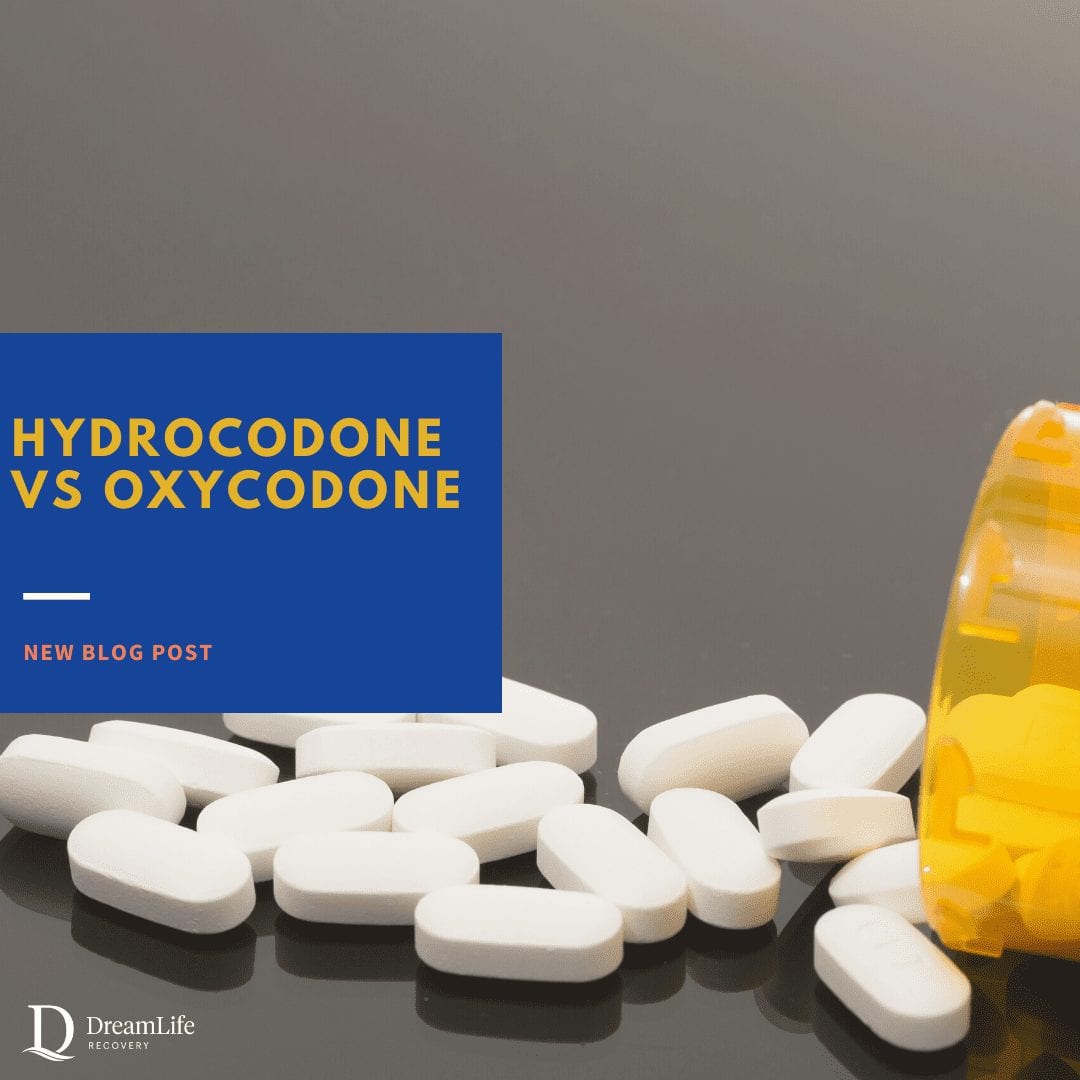Hydrocodone vs Oxycodone

Written By
DreamLife RecoveryIf you are dealing with pain from an injury, surgery, or chronic condition, it is possible that your doctor will prescribe medication for pain relief. There are many prescription pain medications out there but the two most common are hydrocodone and oxycodone. They have the ability to treat short-term and chronic or long-term pain and must be prescribed by a doctor.
These medications can be taken alone but they can also be combined with other medications. For example, oxycodone is often combined with acetaminophen while hydrocodone is often combined with antihistamines to create a cough syrup that suppresses persistent coughing and relieves pain associated with coughing.
While powerful narcotic pain medications like these two can be beneficial to an individual when it comes to pain relief, it’s important to note that they can be highly addictive. Understanding the similarities and differences between hydrocodone vs. oxycodone is important, so you can weigh the risks and rewards.
What is Hydrocodone?
Hydrocodone is a prescription opiate used to treat moderate to severe pain caused by an injury, surgery, or a chronic condition. Brand names include Vicodin, Norco, and Lortab and are a combination of hydrocodone and acetaminophen. It’s important to take hydrocodone exactly how it is prescribed because there is a high risk of addiction. Depending on the level of pain, hydrocodone can be prescribed in pure form as an extended-release capsule so that it is released slowly rather than all at one time. The brand name for hydrocodone without acetaminophen is Zohydro.
Hydrocodone side effects may include:
- Dry mouth
- Drowsiness
- Dizziness
- Nausea
- Vomiting
- Shallow breathing
- Constipation
- Stomach ache
Seizures, rapid heartbeat, and confusion can be severe, but less common side effects.

What is Oxycodone?
Oxycodone is an opiate prescribed to treat moderate to severe pain. Usually combined with other painkillers such as acetaminophen, it can be prescribed in pure form in a well-known pill called Oxycontin. When taking oxycodone, do not consume alcohol as the combination can be deadly.
Side effects include:
- Dry mouth
- Drowsiness
- Dizziness
- Nausea
- Vomiting
- Shallow breathing
- Fatigue
- Headaches
- Feelings of euphoria
Seizures, rapid heartbeat, and confusion can be severe, but are less common side effects.
Hydrocodone vs. Oxycodone Efficacy
In a clinical trial by the National Library of Medicine, the efficacies of hydrocodone and oxycodone were compared side-by-side to determine which pain medicine provided the best treatment for acute pain associated with fractures. Subjects were randomized to receive either 5 milligrams of hydrocodone with acetaminophen or 5 milligrams of oxycodone with acetaminophen. After 30 and 60 minutes, subjects all felt pain relief from their fractures, however, there was no real difference between the two drugs.
Another study was also done by American Family Physician to test the difference between hydrocodone and oxycodone. This test group received the same amount of pain medicine as the previous one, and also found no difference in the management of acute musculoskeletal extremity pain. However, this study did discover that adverse events such as nausea and dizziness occurred significantly more with oxycodone with acetaminophen.
Treatment at DreamLife Recovery
Being prescribed hydrocodone or oxycodone for pain comes with responsibility whether you realize it or not. These pain relief medications are highly addictive and it is crucial to only take them as prescribed by your doctor. If you think that you may be forming a dependency on either medication, you should tell your doctor immediately.
If you or a loved one are possibly addicted to hydrocodone or oxycodone, DreamLife Recovery can help. We have a dedicated staff of clinicians that will help you treat your substance abuse through all stages including detoxification and ongoing treatment. Located in western Pennsylvania, our rehab facility provides an unparalleled level of care as well as a safe environment to aid in your recovery. If you have any questions about our substance abuse treatment programs, contact our admissions department at (844) 402-3592.
Resources:
- Marco CA, Plewa MC, Buderer N, Black C, Roberts A. Comparison of oxycodone and hydrocodone for the treatment of acute pain associated with fractures: a double-blind, randomized, controlled trial. Acad Emerg Med. 2005 Apr;12(4):282-8
- Slawson D. No Difference Between Oxycodone/Acetaminophen and Hydrocodone/Acetaminophen for Acute Extremity Pain. Am Fam Physician. 2016 Mar 1;93(5):411. PMID: 26926980
- “What is the difference between oxycodone and hydrocodone?” – Medical News Today; Danielle Dresden, Rev. by Alan Carter, Pharm.D.; 26 June 2020






